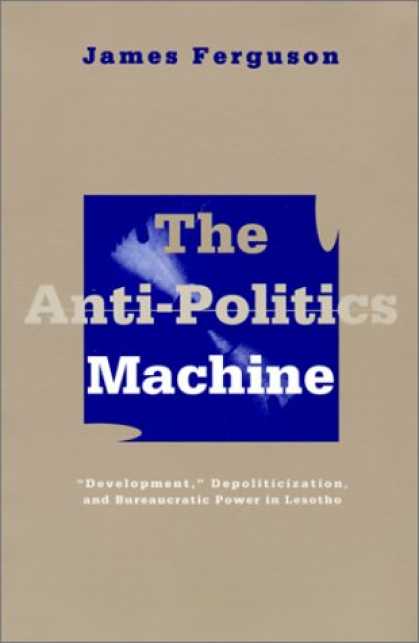 My favorite line from the Anti-Politics Machine is a throwaway. The author, James Ferguson, an anthropologist, describes a World Bank agricultural development program in Lesotho, and also -- through that lens -- ends up describing development programs more generally. At one point he notes that the program failed "as it had to fail" -- not really due to bad intentions, or to lack of technical expertise, or lack of funds -- but because failure was written into the program from the beginning. Depressing? Yes, but valuable.
I read in part because Chris Blattman keeps plugging it, and then shortly before leaving for Ethiopia I saw that a friend had a copy I could borrow. Somehow it didn't make it onto reading lists for any of my classes for either of my degrees, though it should be required for pretty much anyone wanting to work in another culture (or, for that matter, trying to foment change in your own). Here's Blattman's description:
My favorite line from the Anti-Politics Machine is a throwaway. The author, James Ferguson, an anthropologist, describes a World Bank agricultural development program in Lesotho, and also -- through that lens -- ends up describing development programs more generally. At one point he notes that the program failed "as it had to fail" -- not really due to bad intentions, or to lack of technical expertise, or lack of funds -- but because failure was written into the program from the beginning. Depressing? Yes, but valuable.
I read in part because Chris Blattman keeps plugging it, and then shortly before leaving for Ethiopia I saw that a friend had a copy I could borrow. Somehow it didn't make it onto reading lists for any of my classes for either of my degrees, though it should be required for pretty much anyone wanting to work in another culture (or, for that matter, trying to foment change in your own). Here's Blattman's description:
People’s main assets [in Lesotho] — cattle — were dying in downturns for lack of a market to sell them on. Households on hard times couldn’t turn their cattle into cash for school fees and food. Unfortunately, the cure turned out to be worse than the disease.
It turns out that cattle were attractive investments precisely because they were hard to liquidate. With most men working away from home in South Africa, buying cattle was the best way to keep the family saving rather than spending. They were a means for men to wield power over their families from afar.
Ferguson’s point was that development organizations attempt to be apolitical at their own risk. What’s more, he argued that they are structured to remain ignorant of the historical, political and cultural context in which they operate.
And here's a brief note from Foreign Affairs:
The book comes to two main conclusions. First is that the distinctive discourse and conceptual apparatus of development experts, although good for keeping development agencies in business, screen out and ignore most of the political and historical facts that actually explain Third World poverty-since these realities suggest that little can be accomplished by apolitical "development" interventions. Second, although enormous schemes like Thaba-Tseka generally fail to achieve their planned goals, they do have the major unplanned effect of strengthening and expanding the power of politically self-serving state bureaucracies. Particularly good is the discussion of the "bovine mystique," in which the author contrasts development experts' misinterpretation of "traditional" attitudes toward uneconomic livestock with the complex calculus of gender, cash and power in the rural Lesotho family.
The reality was that Lesotho was not really an idyllically-rural-but-poor agricultural economy, but rather a labor reserve more or less set up by and controlled by apartheid South Africa. The gulf between the actual political situation and the situation as envisioned by the World Bank -- where the main problems were lack of markets and technical solutions -- at the time was enormous. This lets Ferguson have a lot of fun showing the absurdities of Bank reports from the era, and once you realize what's going on it's quite frustrating to read how the programs turned out, and to wonder how no one saw it coming.
This contrast between rhetoric and reality is the book's greatest strength: because the situation is absurd, it illustrates Ferguson's points very well, that aid is inherently political, and that projects that ignore that reality have their future failure baked in from the start. But that contrast is a weakness too, as because the situation is extreme you're left wondering just how representative the case of Lesotho really was (or is). The 1970s-80s era World Bank certainly makes a great buffoon (if not quite a villain) in the story, and one wonders if things aren't at least a bit better today.
Either way, this is one of the best books on development I've read, as I find myself mentally referring to it on a regular basis. Is the rhetoric I'm reading (or writing) really how it is? Is that technical, apolitical sounding intervention really going to work? It's made me think more critically about the role outside groups -- even seemingly benevolent, apolitical ones -- have on local politics. On the other hand, the Anti-Politics Machine does read a bit like it was adapted from an anthropology dissertation (it was); I wish it could get a new edition with more editing to make it more presentable. And a less ugly cover. But that's no excuse -- if you want to work in development or international health or any related field, it should be high on your reading list.